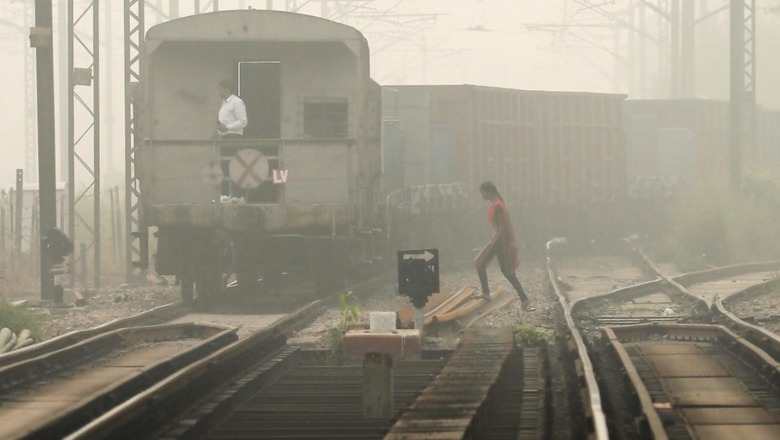
views
In some relief, the air quality in Delhi improved marginally on Sunday from Saturday’s “severe” to “very poor” category and is forecast to remain the same till at least Tuesday. The alarming-level pollution in the NCR region has further triggered a spurt of respiratory illnesses as hospitals continue to receive patients at emergency wards with a rising number of asthma cases in children.
While the Delhi government announced various emergency measures, including closure of schools and colleges for a week, ban on construction activities and work from home for government employees, to deal with the pollution crisis faced by the city, the Haryana government too ordered to shut schools till November 17.
These steps came after the Supreme Court on Saturday came down heavily on the Centre and Delhi government and asked them to take immediate measures to improve the air quality, suggesting steps such as stopping vehicles and clamping a lockdown in the national capital.
Throat-burning smog has been smothering Delhi since November 4. According to an analysis by the Delhi Pollution Control Committee (DPCC), people in the national capital breathe the worst air between November 1 and November 15 every year, as unhelpful meteorological conditions trap pollutants coming from local sources and stubble burning in neighbouring states — Punjab and Haryana.
Here is a comprehensive look at the developments that took place due to air pollution in 10 points:
– The Arvind Kejriwal-led AAP government has decided to submit its lockdown plan to the Supreme Court to urgently tackle the hazardous air quality. Environment Minister Gopal Rai said his government will submit a lockdown proposal to the Supreme Court on Monday to reduce pollution further. The apex court had on Saturday termed the rise in pollution levels an “emergency situation”
– The Delhi Traffic Police has intensified its crackdown against pollution violators and those still plying old vehicles with deployment of teams at 170 locations across the city, officials said on Sunday. The crackdown has been undertaken to execute the city government’s Winter Action Plan against rising air pollution.
– The traffic police have also deployed teams at 13 pollution hotspots’ to keep a tab on the level of pollution in those areas and relay the information further up for necessary action.
– On Saturday, the Delhi government announced closure of physical classes in schools, colleges and other educational institutions for a week from Monday. All government offices, agencies and autonomous bodies, except those involved in essential services, have been asked to work from home. No construction and demolition activity is allowed in the capital till November 17, it announced in a desperate effort to contain spiralling air pollution levels.
– The Haryana government on Sunday announced various measures including closure of all schools, work from home for employees and ban on all types of construction in four districts of Gurugram, Faridabad, Sonipat and Jhajjar till November 17. An order in this regard was issued by the Haryana State Disaster Management Authority with an aim to curb air pollution in these four districts sharing borders with Delhi and falling in the National Capital Region (NCR). The guidelines will come into force with immediate effect, according to the order. The Haryana government’s steps came a day after the Aam Aadmi Party-led Delhi government announced similar measures to deal with the pollution crisis.
– Doctors say there has been a “30 to 40 per cent increase” in the number of people coming to hospitals with respiratory problems. “We have observed an increase in the severity of asthma attacks. Those with pre-existing respiratory issues are requiring hospitalisation. These are acute effects of the hazardous air pollution in the city,” Dr Vikas Maurya, head of Pulmonology Department, Fortis Hospital, Shalimar Bagh, told news agency PTI.
– The hospital has been reporting 25 to 30 cases of respiratory disorders per day. Of these, three to four are of “severe” nature. Around 50-55 patients with breathing issues are admitted in the hospital at present, he said. Dr Abhinav Guliani, pulmonologist, Ganga Ram Hospital, said there has been a two to threefold increase in the number of patients with respiratory infections since Diwali.
– The South Delhi Municipal Corporation (SDMC) has kicked in its winter action plan to tackle dust-pollution under its jurisdiction. According to SDMC officials, the civic body has taken a slew of measures from sprinkling water on roads and empty patches, mechanised sweeping of roads to strict vigil on violators.
– Mayor Mukesh Suryan on Sunday said the SDMC has deployed 24 mechanical road sweeping machines and 83 water sprinklers to mitigate dust pollution on city roads. Besides, it has also set a target of removing dust from at least 600-700 km road stretches everyday.
– Delhi’s Lok Nayak Jai Prakash Hospital has seen a growth of 8 to 10 per cent in patients suffering with respiratory problems due to pollution after Diwali, its Medical Director Dr Suresh Kumar said on Sunday. Talking to IANS, Dr Suresh Kumar said that they everyday have 10-12 patients visiting the hospital with breathing problems. “Air pollution has become a major issues post Diwali. Elderly people and chlidren are the main victim of the pollution,” he said, adding that long-term exposure to chronically high PM 2.5 levels weakens the lungs’ ability to function.
– Supreme Court judge Justice Surya Kant on Saturday said he is a farmer and Chief Justice N V Ramana hails from a farmer family and they know that poor and marginalised farmers in northern states cannot afford to buy machinery for stubble management. “You are saying two lakh machines are available, but the poor farmers cannot afford these machines. After the agrarian laws, the landholding in UP, Punjab and Haryana is less than 3 acres. We can’t expect those farmers to purchase those machines,” Justice Kant told Solicitor General Tushar Mehta. “Why can’t the Centre and the state governments provide the machines. Take away the stubble for use in paper mills and various other purposes. In winters the stubble can be used for fodder for goats, etc. in Rajasthan,” he said. The apex court was hearing a plea filed by environmental activist Aditya Dubey and law student Aman Banka, who sought directions to provide stubble-removing machines to small and marginal farmers for free.
(With inputs from agencies)
Read all the Latest India News here















Comments
0 comment